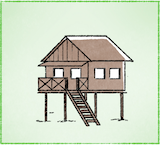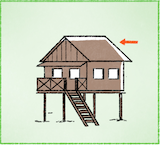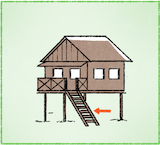


นี้คือหญัง นี้คือบ้าน อันนี้เป็นบ้าน
อันนี้เป็นบ้านคน บ้านคนอยู่ ที่อยู่อาสัยของคนนี้หละ
เป็นบ้านเฮียนไทย บ้านไทย หลือเป็นบ้านไม้นั้นหละ
คนอี่สานสิเอิ้นว่าบ้านไม้ แต่ว่าคนพากกางหลือคนไทยเขาสิเอิ้นบ้านเฮียนไทย บ้านเลียนไทยนั้นหละ
บ้านหลังนี้มันตั้งอยู่ใส บ้านหลังนี้มันตั้งอยู่ใสกะบ่ฮู้ อันนี้กะบ่ฮู้คือกัน จักว่าเขาตั้งอยู่ใส
แต่ว่าคนสิอยู่ใส กะไปส้างบ้านไว้หั้น คนอยากอยู่ใส เขากะไปส้างบ้านไว้หั้น แล้วแต่คนสิไปเฮ็ดสิไปส้างอยู่หั้น
แล้วแต่ บางคนอยากไปอยู่ใส บางคนอยากไปอยู่ใส เขากะไปส้างไว้หั้น
แล้วแต่คน แล้วแต่ที่ดินคน มีที่ดินอยู่ใส กะไปส้างบ้านไว้หั้น
บ้านหลังนี้หลือเฮียนหลังนี้เฮ็ดมาจากอี่หยัง บ้านหลังนี้เป็นบ้านไม้ กะต้องเฮ็ดมาจากไม้ ขั้นบ้านปูน จั่งเฮ็ดมาจากปูน
เป็นหญังบ้านหลังนี้คือสูงแท้ อันนี้กะบ่ฮู้คือกัน แล้วแต่บ้าน แล้วแต่คน แล้วแต่คนสิส้างสิเฮ็ด เพาะว่าอยากให้บ้านสูง กะเฮ็ดเสาสูงๆ อยากให้บ้านต่ำ กะเฮ็ดเสาไว้ต่ำๆ
แต่ว่าบ้านหลังนี้มันสูง เพาะว่าเขาเฮ็ดหลักเสาสูง บ้านหลังนี้มันกะเลยสูง
12
นี้คืออี่หยัง นี้คือหลังคา อันนี้เป็นหลังคาบ้าน หลือหลังคาเฮียนนั้นหละ
หลังคาบ้านนี้เฮ็ดมาจากอี่หยัง กะเฮ็ดมาจากหลังกะสี เฮ็ดมาจากไม้ เฮ็ดมาจากอี่หยังกะได้ ที่มันสามาดทนแดดทนฝนได้ ที่มันสามาดกันลมได้พ้อม
หลังคาอันนี้มีไว้เฮ็ดหญัง หลังคาอันนี้กะมีปะโยดหลาย สำคันคัก สำคันอี่หลี
ขั้นบ่มีหลังคากะบ่แม่นบ้าน เพาะสะนั้นแล้วหลังคาอันนี้กะมีไว้ถ้ากันแดด มีไว้ถ้ากันฝน มีไว้ถ้ากันลมพ้อม
สามาดป้องกันได้ทุกสิ่งทุกอย่าง ขั้นบ้านบ่มีหลังคือ เขากะบ่เอิ้นว่าบ้าน เพาะสะนั้นแล้วทุกบ้านทุกหลังทุกเฮียนต้องมีหลังคา
13
นี้คืออี่หยัง นี้คือบันไดบ้าน นี้คือบันไดเฮียน
บันไดอันนี้เฮ็ดมาจากอี่หยัง บันไดอันนี้กะเฮ็ดมาจากไม้ เฮ็ดมาจากปูนกะได้ แต่ว่าขั้นอันนี้เป็นบ้านไม้ กะต้องเฮ็ดมาจากไม้ ขั้นเป็นบ้านปูน กะเฮ็ดมาจากปูน แล้วแต่บ้าน แล้วแต่หลังเนาะ
บันไดอันนี้มีจักซั้น อันนี้กะบ่ฮู้คือกัน จักว่าบันไดอันนี้มีจักซั้น หลือจักขั้นเนาะ
บ่ได้ไปนับเบิ่ง แต่ว่าเบิ่งแล้ว แนมแล้ว บันไดอันนี้กะสูงเติบ สูงบักคักหนึ่ง กะสิมีหลายซั้น อาดสิมีสิบกว่าซั้นขึ้นไป หลือหลายกว่านั้นกะได้ แล้วแต่ลักสะนะบ้าน แล้วแต่ลักสะนะเฮียน
Link to overview page
Link to dictionary
| Isaan | Pronunciation | Tones | Thai | English/Notes |
|---|---|---|---|---|
| นี้ | ni: | HF | นี้ | 1. this 2. here |
| คือ | khʉ: | HR | คือ | 1. to be, to resemble, like, as 2. why {บักหล้าคือบ่เก็บโต่ะแน่ = [addressing a young boy] Why haven't you cleared the table?} |
| หญัง | ɲaŋ | M | อะไร, เป็นหญัง = ทำไม | 1. what {เขากำลังเฮ็ดหญัง = What is he doing?} {ธูปเอาไว้เฮ็ดหญัง = What are incense sticks for?} 2. something, anything, (nothing) 3. เป็นหญัง[...]คือ in initial position: why {เป็นหญังเขาคือใส่บักพิกลงไปในกวยเตียว = Why is he putting chili in [his] noodle soup?} {เป็นหญังหน้าต่างมันคือเปิด = Why is the window open?} {เป็นหญังมันคือมีควนไฟ = Why is there smoke?} |
| บ้าน | ba:n | HF | บ้าน | 1. house, home 2. village (also used as a prefix before the name of a village) 3. home country, home region {บ้านเฮาเฮ็ดเข้าจั่งใด = How do we plant rice in Isaan/Thailand?} |
| อัน | an | M | อัน | 1. thing, object 2. general clf. for objects |
| เป็น | pen | M | เป็น | 1. to be, to exist 2. to be able to 3. to suffer, sth. happens to 4. เป็นหญัง[...]คือ in initial position: why? {เป็นหญังเขากะคือแปงฟัน = Why is he brushing his teeth?} {เป็นหญังเคี่ยงบินมันคือสิตก = Why is the airplane falling down?} |
| คน | khon | HR | คน | person, people |
| อยู่ | yu: | H | อยู่ | 1. to be (located) at 2. yet, still 3. auxiliary indicating continuous or progressive action {ทอดปาอยู่ในกะทะ = (in the process of) frying a fish in the pan} {แม่กำลังเมี้ยนเฮียนอยู่ = mother is cleaning/tidying up the house} |
| ที่อยู่อาสัย | thi:-yu:-a:-sai | H-H-M-M | ที่อยู่อาศัย | place of residence, dwelling |
| ของ | khɔ:ŋ | M | ของ | of, belonging to |
| นี้หละ | ni:-la | HF-M | นี่แหละ | auxiliary for emphasis at the end of a phrase |
| เฮียน | hi:an | HR | เรือน | house, home |
| ไทย | tha:i | HR | ไทย | Thai {ปะเทดไทย = Thailand} {คนไทย = Thai (person)} |
| หลือ | lʉ: | M | หรือ | or |
| ไม้ | mai | HF | ไม้ | wood, tree |
| นั้นหละ | nan-la | HF-M | นั่นแหละ | auxiliary for emphasis at the end of a phrase |
| อี่สาน | i:-sa:n | H-M | อีสาน | Isaan {คนอี่สาน = Isaan person} |
| สิ | si | M | จะ | future tense auxiliary {เขากำลังสิตื่น = he's about to wake up} {สิไปตะหลาด = [I'm] going to the market} |
| เอิ้น | ə:n | HF | พูด, เรียก | to call, to say {เอิ้นง่ายๆ ว่า = in other words} {คนอี่สานเอิ้นว่า เป็นลูกคนกก = Isaan people call her ลูกคนกก} |
| ว่า | wa: | H | ว่า | 1. that, as {คำว่า X = the word X} 2. to say |
| แต่ว่า | tɛ:-wa: | H-H | แต่ว่า | 1. but 2. only {ฮู้แต่ว่าเขายืนอยู่พุเดียว = I only know that he's standing there by himself} |
| พาก | pha:k | HF | ภาค | part {พากอี่สาน = Isaan (as a region)} {พากกาง = Central Thailand} |
| กาง | ga:ŋ | M | กลาง | middle, center |
| เขา | khao | M | เขา | personal pronoun: he, she |
| บ้านเลียน | ba:n-li:an | HF-HR | บ้านเรือน | house, home |
| หลัง | laŋ | M | หลัง | 1. back, after 2. back (of body) {ขี่หลังควย = to ride on a water buffalo} 3. clf. for houses {บ้านหลังใหญ่ = a large house} {เฮียนไม้หลังเก่า = an old wooden house} |
| มัน | man | HR | มัน | it (also used to refer to people) |
| ตั้ง | taŋ | HF | ตั้ง | to set/put up, to install, to establish, to erect {เขาตั้งนาลิกาปุกตอนสองโมงเซ้า = he sets the alarm clock to eight o'clock in the morning} {พัดลมตั้งโต่ะ = table fan} {ทะนาคานมันสิไปตั้งไว้อยู่ซู่หม้องเอาโลด = banks are [established/can be found] everywhere!} {ตั้งไฟ = to set up a fire} |
| ใส | sai | M | (ที่)ไหน | 1. where? {สิไปใส = Where are [you] going?} {มาแต่ใส = Where are [you] coming from?} {กะทะอยู่ใส = Where's the pan?} 2. somewhere, anywhere {ใสกะได้ = anywhere, wherever you like} |
| กะ | ga | M | ก็ | 1. then, consequently 2. also |
| บ่ | bɔ: | H | ไม่ | 1. no, not 2. question particle, transforming a statement into a question Notes: spelling exception in line with common usage on social media |
| ฮู้ | hu: | HF | รู้ | 1. to know 2. to understand Notes: equivalent to ลู้ |
| คือกัน | khʉ:-gan | HR-M | เหมือนกัน | 1. also, likewise, similarly {ยินดีที่ได้ฮู้จักคือกันคับ = Nice to meet you too!} 2. in negative sentences: either {บ่ลู้คือกัน = I don't know either} {จักคือกัน = I don't know (either)} |
| จัก | jak | M | จัก | 1. answer to a question: [I] don't know, don't know exactly, [I'm] not sure {พุซายคนนี้เขาเถ้าไป่ จัก จักเถ้าหลือบ่เถ้า เบิ่งบ่ค่อยออก = Is this man here already old? I don't know. I can't see clearly whether he's old or not.} {เขาเว้ากันอยู่ใส จักคือกัน = Where are they talking? I don't know either.} 2. exact(ly), what exactly {จักต้มอี่หยังกะบ่ฮู้ = I don't know what (exactly) he is cooking} {บ่ลู้คือกันจักปาอี่หยัง = I don't know either what kind of fish this is} 3. how much/many? {ต้นไม้มีจักต้น = How many trees are there?} {ตอนนี้จักโมงแล้ว = What time is it now?} {มือของเฮานี้สิมีจักนิ้ว = How many fingers do our hands have?} 4. a bit, a little bit {จักหน่อย/จักหน่อยหนึ่ง = a bit, a little bit} |
| ไป | pai | M | ไป | 1. to go 2. auxiliary indicating action extending into the future |
| ส้าง | sa:ŋ | LF | สร้าง | to build {ส้างบ้านส้างเฮียน = to build a house} |
| ไว้ | wai | HF | ไว้ | 1. to keep, to put, to place, to retain, to save, to reserve {เขาเอาหัวของเขาไว้ใส = Where does she put her head?} {หมาสิเลี้ยงไว้บ้าน = dogs are kept/raised in the house} {ไก่เลี้ยงไว้ในคอก = chicken are kept/raised in a coop} {หน้ามันบังไว้ = the face is covered/not visible} {เขาเอาโทละสับวางไว้หู = he holds the phone to his ear} 2. for {นาลิกาปุกมีไว้เฮ็ดหญัง = What is an alarm clock for?} {หม้อเอาไว้เฮ็ดแนวกิน = a pot is used to make food} {ก่องเอาไว้เฮ็ดหญัง ก่องเอาไว้ใส่ของ = What is the box for? It's for putting in stuff.} Notes: see also ไว้ถ้า |
| หั้น | han | LF | ที่นั่น | there, over there |
| อยาก | ya:k | LF | อยาก | to want, to wish |
| แล้วแต่ | lɛ:o-tɛ: | HF-H | แล้วแต่ | up to, depending on |
| เฮ็ด | het | H | ทำ | to do, to make |
| บาง | ba:ŋ | M | บาง | 1. some {สัดบางโตบ่มีขา = some animals don't have legs} {บางคนสิมักกินกวยเตียวแทนเข้า = some people like to eat noodle soup instead of rice (dishes)} {บางสิ่งบางอย่าง = something, anything} 2. thin |
| ที่ดิน | thi:-din | H-M | ที่ดิน | land, plot of land, real property |
| มี | mi: | HR | มี | 1. to have 2. there is |
| มา | ma: | HR | มา | 1. to come 2. auxiliary expressing action towards the present or focal time {กะคุเฮ็ดมาจากอี่หยัง = What is the bucket made of?} {แล้วเขากะเก็บเงินจากพุนั้นมา = and then she takes the money of that person} |
| จาก | ja:k | LF | จาก | 1. from {... เฮ็ดมาจากอี่หยัง = ... is made from what?} 2. to depart |
| อี่หยัง | i:-yaŋ | H-M | อะไร | 1. what {นี้คืออี่หยัง = What is this?} {มื้อนี้เจ้าเฮ็ดอี่หยัง = What are you doing today?} {กินเข้างายกับอี่หยัง = What did you have for breakfast?} 2. something, anything, (in negations) nothing {บ่ต้องเฮ็ดอี่หยังอีกเลยนอกจากใส่ปุย = [we] don't need to do anything besides adding fertilizer} |
| ต้อง | tɔŋ | HF | ต้อง | to have to, must |
| ขั้น | khan | LF | เมื่อ | when, if |
| ปูน | pu:n | M | ปูน | cement {บ้านปูน = house with stone walls, as opposed to บ้านไม้} |
| จั่ง | jaŋ | H | ค่อย (?) | then, afterwards {ต้องใซ้น้ำมันพ้อม มันจั่งสิทอดได้ = one needs to use oil as well, then one can fry [food]} |
| สูง | su:ŋ | M | สูง | high, tall |
| แท้ | thɛ: | HF | แท้ | truly, surely, really, indeed |
| เพาะว่า | phɔ-wa: | H-H | เพราะว่า | because |
| ให้ | hai | LF | ให้ | 1. to give {หมอกำลังเอายาให้คนป่วยกิน = the doctor is giving the patient medicine} 2. for 3. to allow, to be allowed |
| เสา | sao | M | เสา | pillar, column, post, pole {เสาธงซาด = flag pole} |
| ต่ำ | tam | H | ต่ำ | low |
| หลัก | lak | M | หลัก | 1. post, pole, pillar 2. main-, major- {คำว่าเมี้ยนนี้ หลักๆ หนิกะสิหมายถึงว่า [...] = the main meaning of the word เมี้ยน is [...]} |
| เลย | lə:i | HR | เลย | 1. futher on, beyond, past {เข็มน้อยเลยเลขสิบสองไป = the minute hand has passed number twelve} 2. too much 3. at all 4. definitively 5. completely, utterly |
| หลังคา | laŋ-ka: | M-HR | หลังคา | roof |
| หลังกะสี | laŋ-ga-si: | M-M-M | สังกะสี | corrugated iron Notes: หลัง- (from หลังคา) because it's usually used for roofs |
| ได้ | dai | HF | ได้ | 1. can 2. to get, to obtain 3. before verb: indicating past tense 4. บ่ได้ + verb: not |
| ที่ | thi: | H | ที่ | 1. that, which {คนที่ยืนอยู่ฝั่งขวา = the person which is standing on the right = the person standing on the right} {เว้าคำที่บ่สุพาบ = to speak words which are impolite = to speak impolitely} 2. for ordinal numbers {ที่สาม = third} |
| สามาด | sa:-ma:t | M-HF | สามารถ | can, to be able |
| ทน | thon | HR | ทน | to last, to resist, to withstand, to endure, to tolerate, to bear |
| แดด | dɛ:t | LF | แดด | sunlight |
| ฝน | fon | M | ฝน | rain |
| กัน | gan | M | กัน | to protect from, to keep out, to prevent {เอาไว้ถ้ากันความฮ้อน = to protect against the heat} |
| ลม | lom | HR | ลม | wind |
| พ้อม | phɔ:m | HF | พร้อม | at the same time, also, too {มีตะเว็นพ้อม = the sun's out, too} {กะทะมีด้ามพ้อม = the pan has also a handle} |
| ปะโยด | pa-yo:t | M-LF | ประโยชน์ | 1. benefit 2. useful |
| หลาย | la:i | M | เยอะ, มาก | many, much, very |
| สำคัน | sam-khan | M-HR | สำคัญ | important |
| คัก | khak | H | intensifier: very, very much | |
| อี่หลี | i:-li: | H-M | จริง | intensifier: really Notes: pronunciation: also realized as อี่หลิ |
| บ่แม่น | bɔ:-mɛ:n | H-H | ไม่ใช่ | 1. not {เขาเป็นพุหญิง เขาบ่แม่นพุซาย = she's a woman, she's not a man} 2. no |
| เพาะสะนั้นแล้ว | phɔ-sa-nan-lɛ:o | H-M-HF-HF | เพราะฉะนั้นแล้ว | therefore, for that reason, consequently Notes: pronunciation: also realized as เพาะฉะนั้น |
| ไว้ถ้า | wai-tha: | HF-LF | usually in a positive statement or answer: is for, is used for, has the purpose of {กะทะมีไว้ถ้าทอด = a pan is for frying} {น้ำบักนาวมีไว้ถ้าปุงอาหาน = lime juice is used to season food} {ปากกามีไว้ถ้าเขียน = a pen is for writing} {กะเทียมเอาไว้ถ้าเฮ็ดแนวกิน = garlic is used to make food} {ขาเอาไว้ถ้าญ่าง = legs are for walking} {เกิบเอาไว้ถ้าใส่ = shoes are for wearing} Notes: see also ไว้ |
|
| ป้องกัน | pɔŋ-gan | HF-M | ป้องกัน | to protect, to defend |
| ทุก | thuk | H | ทุก | every Notes: also pronounced ทุ as in ทุมื้อๆ = everyday, always |
| สิ่ง | siŋ | H | สิ่ง | thing, object |
| อย่าง | ya:ŋ | H | อย่าง | type, kind, sort, category |
| บันได | ban-dai | M-M | บันได | stairs, staircase, ladder |
| เนาะ | nɔ | H | เนาะ | final particle: makes the statement softer, looking for agreement |
| ซั้น | san | HF | ชั้น | 1. floor, shelf, step of a staircase {ซั้นเก็บเสี้ยผ้า = clothes shelf} {ซั้นวางหนังสือ = book shelf} 2. level, grade, class {ซั้นมอสี่ = secondary school grade four} 3. layer |
| ขั้น | khan | LF | ขั้น | step (of a staircase), rung |
| นับ | nap | H | นับ | to count, to count as |
| เบิ่ง | bəŋ | H | ดู | 1. to look at, to see, to watch {เบิ่งโทละทัด = to watch TV} {เบิ่งหนัง = to watch a movie} 2. to guess {เบิ่งซงแล้ว ... = [I] guess / from what it looks like ...} |
| แล้ว | lɛ:o | HF | แล้ว | 1. finished 2. already 3. and then, and next (especially แล้วกะ) 4. auxiliary for past tense |
| แนม | nɛ:m | HR | มอง | to look, to glance, to stare {เขากำลังยืนแนมก้อนหินอยู่ = he's standing and looking at the stone/rock} {ข้างหนึ่งแนมเห็น อีกข้างหนึ่งแนมบ่เห็น = [we] see one side, [we] can't/don't see the other side} |
| เติบ | tə:p | LF | intensifier: very, much {เว้ากันโดนเติบ = to talk a long time} | |
| บักคักหนึ่ง | bak-khak-nʉŋ | M-H-H | intensifier: very, very much (variant of คัก) | |
| อาด | a:t | LF | อาจ | 1. might, may, will 2. likely |
| สิบ | sip | M | สิบ | ten |
| กว่า | gwa: | H | กว่า | more, more than, comparative: as, than |
| ขึ้น | khʉn | LF | ขึ้น | 1. to go up, to increase 2. sun: to rise {ตะเว็นกำลังขึ้น = the sun is rising} 3. more 4. bus/train etc.: to get on, to board {พุโดยสานขึ้นลดไฟเบิดแล้ว = all passengers have boarded the train} |
| นั้น | nan | HF | นั้น | that, there |
| ลักสะนะ | lak-sa-na | H-M-H | ลักษณะ | feature, characteristic, quality |